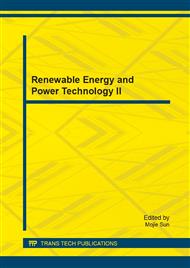p.1197
p.1201
p.1205
p.1210
p.1214
p.1219
p.1224
p.1234
p.1238
Efficiency Optimization in Speed-Sensorless Control of Induction Motors
Abstract:
An efficiency optimization model for induction motors with speed-sensorless control is presented in this paper. An mathematical loss model with stator iron loss in DTC(Direct Torque Control) system is used to calculate the motors loss, the loss efficiency and the optimal flux. Additionally, the efficiency optimization control strategy combined with the speed-sensorless model is used to rebuild the simulation modeling. The simulation results with the proposed control strategy show superior effects compared to the traditional control methods. The optimal control strategy can be achieved to improve the motor efficiency.
Info:
Periodical:
Pages:
1214-1218
Citation:
Online since:
October 2014
Authors:
Keywords:
Price:
Сopyright:
© 2014 Trans Tech Publications Ltd. All Rights Reserved
Share:
Citation:


